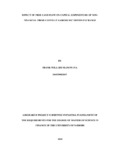| dc.contributor.author | Mangwaya, Frank; W | |
| dc.date.accessioned | 2019-01-28T08:39:38Z | |
| dc.date.available | 2019-01-28T08:39:38Z | |
| dc.date.issued | 2018 | |
| dc.identifier.uri | http://hdl.handle.net/11295/105685 | |
| dc.description.abstract | The objective of the study was to examine the effect of free cash flow on capital expenditure for non-financial firms listed at Nairobi Securities Exchange. The study embraced a descriptive research design aimed at analysing the effect of free cash flow on capital expenditure of non-financial firms listed at NSE. The study involved analysing a population of 32 non-financial firms listed at NSE. In the study businesses that operate in financial sector were exempted due to the differing reporting requirements in the sector and the regulations that do not apply to the non-financial companies. The study involved capital expenditure as dependent variable with free cash flow, financial leverage and dividend policy as independent variables. The study used secondary data extracted from annual reports and financial statements of the firms taken from NSE and CMA covering a period of five years (2013-2017). Subsequent to the sorting, cleaning and mathematical transformation of the data two statistical packages EViews 7 and SPSS 20 were used to analyse the data. The regression results using fixed-effect model indicate that the adjusted coefficient of determination is at 0.919 which meant that the variation of dependent variable capital expenditure is explained by 91.9%. This meant that only 8.1% of the variation was not explained by the regression model. The probability of F-statistic was also found to be significant at (0.00). The results revealed that there is a positive and significant relationship between free cash flow and capital expenditure. The results obtained depicted a coefficient value of 0.1904 and a statistical significance of (0.0022). The study also indicated that the existence of a negative relationship between financial leverage with a coefficient value of 0.00193 and 0.6382 significance level. In addition, the study also revealed a negative and non-significant relationship between dividend policy and capital expenditure. The results showed that there is an effect of free cash flow on capital expenditure for non-financial firms listed at NSE. This entailed that firms use the propositions of pecking order theory when making financing decisions as they use internal funds first before resorting to external debts in form of debt and equity. | en_US |
| dc.language.iso | en | en_US |
| dc.publisher | University of Nairobi | en_US |
| dc.rights | Attribution-NonCommercial-NoDerivs 3.0 United States | * |
| dc.rights.uri | http://creativecommons.org/licenses/by-nc-nd/3.0/us/ | * |
| dc.subject | Effect of Free Cash Flow on Capital Expenditure of Non-financial Firms Listed at Nairobi Securities Exchange | en_US |
| dc.title | Effect of Free Cash Flow on Capital Expenditure of Non-financial Firms Listed at Nairobi Securities Exchange | en_US |
| dc.type | Thesis | en_US |



